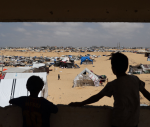You are here
The IMF needs to lead on climate finance
Dec 16,2023 - Last updated at Dec 16,2023
By Laurence Tubiana and Kevin P. Gallagher
PARIS/BOSTON — With their agreement at COP28 to “transition away from fossil fuels in energy systems”, countries have made genuine progress on tackling climate change. But there is still much to do to mobilise the level of financing needed to turn the commitment into reality. International organisations, especially the International Monetary Fund (IMF), must step up. Though the IMF was relatively slow off the mark in the race to combat climate change, it has made great strides under Managing Director Kristalina Georgieva. But it must take its climate leadership much further.
The Independent High-Level Expert Group on Climate Finance estimates that, between now and 2030, emerging-market and developing economies will need to mobilise $2.4 trillion annually to fight climate change, with $1 trillion of that sum coming from external sources. This might seem high, but it is nothing compared to the costs of inaction.
Already, severe hurricanes and flooding in the Caribbean, drought in Sub-Saharan Africa and Argentina, and wildfires in many advanced economies are fueling instability and causing severe economic damage, including balance-of-payments crises in some countries. As climate-related disasters multiply and intensify, the costs of building resilience and moving onto a low-carbon development path will only rise, while countries’ ability to cover those costs will fall.
To avert this outcome, the IMF, the only multilateral institution charged with promoting the stability of the international financial and monetary system, with the goal of facilitating longer-run development, has a critical role to play. After all, fiscal-resource mobilisation and financial stability are at the heart of the IMF’s mandate.
Like much of the financial system, the IMF was slow to grasp that climate change could be just as “macro-critical” as, say, advanced-economy interest-rate shocks, wars, or financial crises. But this is now changing. In 2021, the IMF conducted a “comprehensive surveillance review”, which led the Executive Board to mandate that climate change be placed at the center of the Fund’s surveillance and advisory operations. A comprehensive climate strategy soon followed. And last year, the IMF created the Resilience and Sustainability Trust to help low-income and vulnerable middle-income countries withstand climate shocks.
These actions put the IMF at the forefront of the climate fight. To solidify this position, the Fund is now adding staff, improving its modeling of climate-related issues, updating its country advice, and providing more financing for the climate-vulnerable. But, according to a preliminary assessment by the independent Task Force on Climate, Development, and the IMF, the Fund must do much more.
While praising the IMF’s recent progress, the Task Force urges the institution to diversify its policy advice beyond carbon taxes. While putting a price on carbon-intensive activities is undoubtedly important, both to increase government revenues and to motivate economic actors to reduce their emissions, it is no panacea. Other, complementary policies, such as emissions standards, fossil-fuel phase-outs, and green industrial policy, also warrant consideration.
Yet another shortcoming of the IMF’s current approach is that its advice on climate mitigation covers only the top 20 carbon-emitting economies, and only on a voluntary basis. This is shortsighted, not least because today’s top emitters might not be tomorrow’s.
More broadly, the IMF must ensure that all of its surveillance and advice related to climate change advances one core mission: helping member countries mobilise the trillions of dollars needed to fund the green transition in a manner that is fiscally sound, politically feasible, and compatible with financial stability. Crucially, this includes helping countries prepare for and recover from climate shocks, and identifying and developing viable substitutes for the economic activity and fiscal revenues currently provided by fossil fuels.
The RST is a welcome addition to the IMF’s toolkit, but it needs to be scaled up. The same goes for the Catastrophe Containment and Relief Trust (CCRT), which covers debt-service payments for the poorest and most vulnerable countries when they are struck by catastrophic natural disasters or public-health crises.
As it stands, climate-vulnerable countries together owe roughly $40 billion to the IMF, yet most of them are currently ineligible for the CCRT, which has only $100 million to disburse. The CCRT must be given the means to deliver more funding to more countries. Similarly, more countries need “pause clauses” in their IMF loan agreements, as the World Bank has just pledged to implement, so that they do not have to make debt-service payments while fighting climate shocks.
Another key priority for the IMF must be to align its main lending programmes with the 2015 Paris climate agreement, and ensure that its loan conditions properly account for the fiscal costs of pursuing the UN Sustainable Development Goals in debt-distressed countries. IMF research has found that “green stimulus” packages would deliver a major boost to growth. Likewise, a Brookings Institution study has shown that if countries deployed stimulus packages in times of economic distress, they would achieve higher growth and improved creditworthiness, while mobilising the finance they need to combat climate change.
The latest UN Framework Convention on Climate Change report is right: when it come to ambitious climate action, it is “now or never”. The IMF should heed that warning and step up its ambition to mobilise the financing the world needs to confront the climate crisis. There are no second chances.
Laurence Tubiana, a former French ambassador to the United Nations Framework Convention on Climate Change, is CEO of the European Climate Foundation and a professor at Sciences Po, Paris. Kevin P. Gallagher is professor of Global Development Policy at Boston University and director of the Boston University Global Development Policy Center. Copyright: Project Syndicate, 2023.














Add new comment